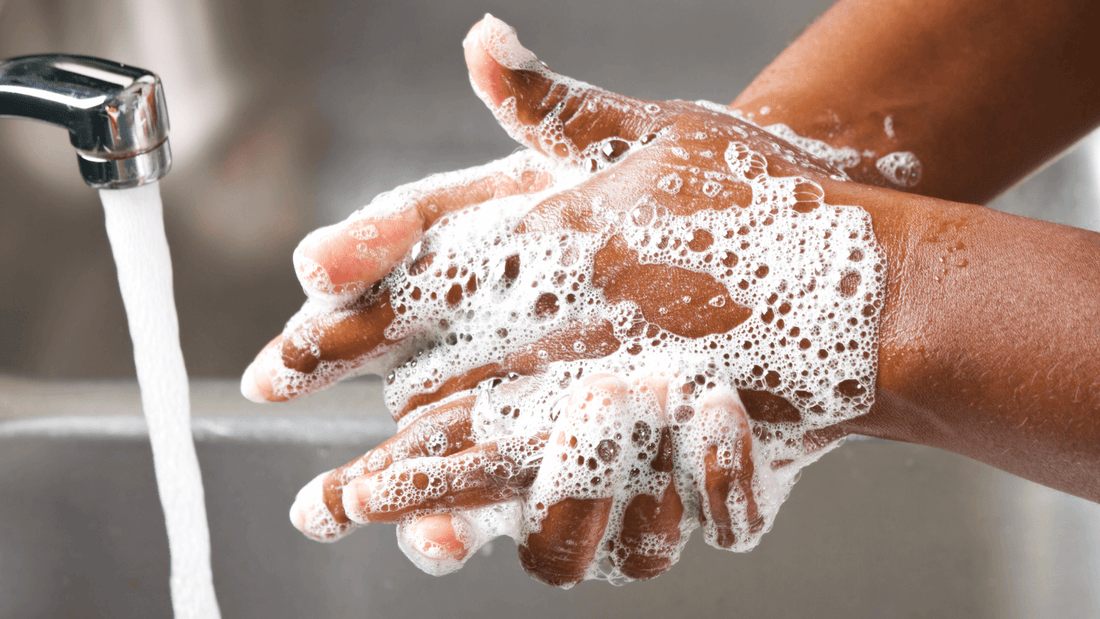Besondere Anforderungen an unsere Hautpflege während und nach der COVID-19-Pandemie

Die COVID-19-Pandemie hat nicht nur unseren Alltag verändert — auch unsere Haut wurde stark beansprucht. Häufiges Händewaschen, das Tragen von Masken und eine allgemein erhöhte Belastung des Körpers haben ihre Spuren hinterlassen.
Wie kann die Hautpflege darauf reagieren — und was braucht unsere Haut jetzt?
Händewaschen: notwendig, aber strapazierend
Regelmäßiges Händewaschen ist eine der wichtigsten Maßnahmen zur Infektionsprävention. Doch durch die ständige Reinigung mit Wasser, Seife oder Desinfektionsmitteln leidet die Hautbarriere.
Die Folge:
-
Austrocknung
-
Rötungen und Risse
-
Eine gestörte Schutzfunktion
-
Günstige Bedingungen für das Eindringen von Keimen wie Staphylococcus aureus
Vor allem Menschen mit Handekzem sind gefährdet. Die ohnehin empfindliche Haut kann sich kaum regenerieren — ein Kreislauf aus Reizung und Entzündung entsteht.
Tipp: Verwende nach jedem Händewaschen eine rückfettende, barrierefreundliche Pflege. Für eine intensive Regeneration: eine dicke Cremeschicht über Nacht unter Baumwollhandschuhen.
Wichtig sind Produkte, die die Hautbarriere stärken und das Mikrobiom im Gleichgewicht halten — besonders bei zu Ekzemen neigender Haut.
Hautprobleme durch das Tragen von Masken
Auch das Tragen von Schutzmasken hat die Haut strapaziert — insbesondere im Bereich um Mund und Kinn. Durch die entstehende Feuchtigkeit und Wärme unter der Maske kommt es häufig zu:
-
Schwellungen
-
Reizungen
-
Störung der Hautbarriere
-
Überwucherung bestimmter Bakterien
Diese Bedingungen können zu perioraler Dermatitis führen — eine entzündliche Reaktion rund um den Mund.
Tipp: Wechsle Masken regelmäßig, reinige dein Gesicht sanft und verwende nur leichte, mikrobiomfreundliche Pflege unter der Maske. Verzichte auf okklusive Texturen.
Hausmittel: Schwarztee-Kompressen haben eine beruhigende und antibakterielle Wirkung. Einfach schwarzen Tee aufkochen, 20 Minuten ziehen lassen, abkühlen und mit getränkten Wattepads auf die betroffene Stelle legen.
Tipp: Baumwollmasken sind hautfreundlicher und können hygienisch gewaschen werden.
Haut und Immunsystem: ein sensibles Zusammenspiel
Während der Pandemie rückten auch Menschen mit immunsupprimierenden Therapien (z. B. bei Neurodermitis oder Psoriasis) in den Fokus. Bei ihnen kann das Infektionsrisiko erhöht sein, weshalb eine stabile Hautbarriere besonders wichtig ist.
Auch COVID-19 selbst kann sich auf der Haut äußern, wie bei anderen Virusinfektionen. Die spanische dermatologische Gesellschaft hat fünf Hautveränderungen identifiziert — von Bläschen bis hin zu Gefäßveränderungen. Diese sollten immer ärztlich abgeklärt werden.
Jetzt ist die Zeit für echte Hautregeneration
Viele Menschen spüren bis heute, dass ihre Haut empfindlicher, trockener oder unausgeglichener ist. Jetzt ist der richtige Zeitpunkt für gezielte Pflege, die die Hautbarriere stärkt, Feuchtigkeit spendet und das Mikrobiom unterstützt.
Denn unsere Haut hat genauso viel durchgemacht wie wir — und verdient jetzt besondere Fürsorge.
